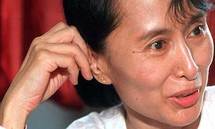Top UN council hesitant on Myanmar condemnation
Gerard Aziakou
UNITED NATIONS, Gerard Aziakou - A divided UN Security Council on Wednesday scrapped a meeting that western diplomats hoped would sharply criticize Myanmar for the extended detention of democracy icon Aung San Suu Kyi.
Envoys sought China's support for a Security Council resolution condemning the Beijing ally, and calling for the release of Suu Kyi, who on Tuesday was ordered to serve another 18 month under house arrest.

On Tuesday, the 15 ambassadors paused closed-door consultations without agreement on the US-drafted statement, which also demanded the release of all political prisoners.
Several countries, including Vietnam and veto-wielding China and Russia, insisted on getting instructions from their capitals before moving acting further on the text.
Britain's UN ambassador John Sawers -- who chairs the council this month -- on Wednesday met China's deputy UN ambassador Liu Zhenmin ahead of talks between the council's five permanent members: Britain, China, France, Russia and the United States, said a diplomatic source, who asked not to be named.
Sawers' aides gave no details on the substance of Wednesday's closed-door discussions, but the failure to convene a full council meeting clearly suggested that the Western sponsors of the text needed more time to forge a consensus.
The Chinese delegation could not be reached for comment on what instructions it received from Beijing regarding the non-binding statement, which requires unanimous support to be adopted.
China, which on Wednesday called for Myanmar's judicial sovereignty to be respected, has long helped keep Myanmar afloat through trade ties, arms sales, and by shielding it from UN sanctions over rights abuses.
In return, China is assured of a stable neighbor and gets access to Myanmar's natural resources.
Trade between the two countries grew 26.4 percent to 2.6 billion dollars in 2008, according to China's ministry of commerce.
The US-drafted text "condemns the conviction and sentencing of Aung San Suu Kyi and expresses grave concern about the political impact this action has on the situation in Myanmar."
It calls on the Myanmar government "to release Aung San Suu Kyi and all other political prisoners."
It also underlines the need for the military regime "to establish the conditions and create an atmosphere conducive to an inclusive and credible political and electoral process with full participation by all political actors."
A court in Myanmar on Tuesday convicted Suu Kyi for breaching the terms of her detention, following a bizarre incident in which an American man swam uninvited to her home.
Judges sentenced her to three years hard labor and imprisonment, but military ruler Than Shwe signed a special order commuting the sentence and ordering her to serve a year and a half under house arrest.
Unless she qualifies for an amnesty, the 64-year-old opposition leader and Nobel peace laureate will not be able to contest elections planned for next year.
UN talks following her sentencing have mimicked those in October 2007 on a council statement deploring the military regime's crackdown on peaceful demonstrators, diplomats said.
Then China and Russia insisted it was an internal matter. Other council members Vietnam and Libya also invoked the need not to interfere in the domestic affairs of a UN member state, resisting any push by the United States, France and Britain for punitive measures against Myanmar's rulers.
Suu Kyi has been kept in detention for nearly 14 of the past 20 years, since the military regime refused to recognize her National League for Democracy's landslide victory in 1990 elections.
----------------------------------------------------------------------------------------------------------------------------